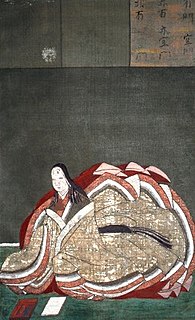A Quote by E. M. Forster
It was not that ladies were inferior to men; it was that they were different. Their mission was to inspire others to achievement rather than to achieve themselves. Indirectly, by means of tact and a spotless name, a lady could accomplish much. But if she rushed into the fray herself she would be first censured, then despised, and finally ignored.
Related Quotes
Yet there were times when he did love her with all the kindness she demanded, and how was she to know what were those times? Alone she raged against his cheerfulness and put herself at the mercy of her own love and longed to be free of it because it made her less than he and dependent on him. But how could she be free of chains she had put upon herself? Her soul was all tempest. The dreams she had once had of her life were dead. She was in prison in the house. And yet who was her jailer except herself?
There was a warmth of fury in his last phrases. He meant she loved him more than he her. Perhaps he could not love her. Perhaps she had not in herself that which he wanted. It was the deepest motive of her soul, this self-mistrust. It was so deep she dared neither realise nor acknowledge. Perhaps she was deficient. Like an infinitely subtle shame, it kept her always back. If it were so, she would do without him. She would never let herself want him. She would merely see.
She realized how many of her beliefs were either unrealistic or belonged to her deceased parents and her ex-husband. She also realized that her expectations for herself and others were sometimes too rigid. She was trying to live up to what everyone else said was best for her, which made her depressed and hard to be around at times. Once she changed her beliefs about herself and others, she began to smile more and enjoy life.
Anais Nin shows an occasional grace in writing, but her work is quite foreign to me, precisely because she wants so much to be feminine and not feminist. And then she is so gaga before so many men. She talks about men I know in France, men who were less than nothing, and she considers them kings, extraordinary people.
Madame Lefoux acted as midwife. In her scientific way, she was unexpectedly adept at the job. When the infant finally appeared, she held it up for Alexia to see, rather proudly, as though she'd done all the hard work herself. 'Goodness,' said an exhausted Lady Maccon, 'are babies customarily that repulsive looking?
although she went home that night feeling happier than she had ever been in her short life, she did not confuse the golf course party with a good party, and she did not tell herself she had a pleasant time. it had been, she felt, a dumb event preceded by excellent invitations. what frankie did that was unusual was to imagine herself in control. the drinks, the clothes, the instructions, the food (there had been none), the location, everything. she asked herself: if i were in charge, how could i have done it better?
Once again she would arrive at a foreign place. Once again be the newcomer, an outsider, the one who did not belong. She knew from experience that she would quickly have to ingratiate herself with her new masters to avoid being rejected or, in more dire cases, punished. Then there would be the phase where she would have to sharpen her senses in order to see and hear as acutely as possible so that she could assimilate quickly all the new customs and the words most frequently used by the group she was to become a part of--so that finally, she would be judged on her own merits.






































